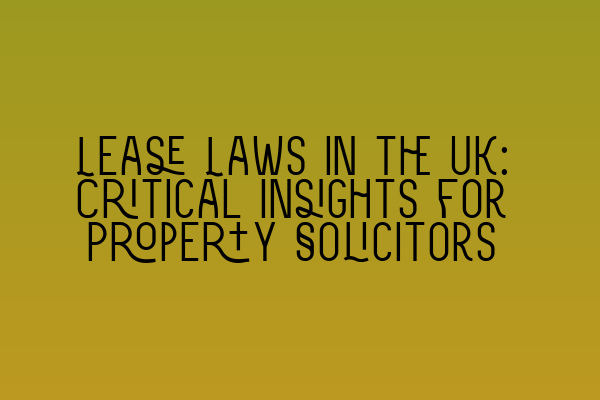Lease Laws in the UK: Critical Insights for Property Solicitors
As a property solicitor, understanding lease laws in the UK is essential to effectively advising clients and ensuring transactions are legally sound. Lease agreements are a fundamental aspect of property law, and they govern the rights and obligations of landlords and tenants in a leasehold property. In this blog post, we will delve into the intricacies of lease laws in the UK, providing critical insights that will help property solicitors navigate this complex area of law.
1. Fundamental Elements of a Lease Agreement
A lease agreement is a legally binding contract between a landlord and tenant. It sets out the terms and conditions under which the tenant is allowed to occupy and use the property. Key elements of a lease agreement include:
– Parties involved: Clearly identify the landlord and tenant, including their full legal names and contact details.
– Term of the lease: Specify the duration of the lease, whether it’s a fixed term or periodic tenancy.
– Rent payment: Provide details of the rent amount, payment frequency, and acceptable methods of payment.
– Repair and maintenance obligations: Outline the responsibilities of both the landlord and tenant for maintaining the property.
– Permitted use: Clearly state the allowed use of the premises. This can be limited to specific purposes or include a wide range of activities.
– Termination clauses: Include provisions for terminating the lease, such as notice periods and circumstances for early termination.
2. Types of Leasehold Tenancies
In the UK, there are several types of leasehold tenancies, each with unique considerations:
– Assured Shorthold Tenancy (AST): The most common form of residential tenancy in the UK. ASTs provide tenants with the right to occupy the property for a predetermined period, usually six to twelve months.
– Secure Tenancy: Typically offered by local authorities or housing associations, secure tenancies provide long-term stability for tenants. These tenancies are protected by law, and tenants have the right to remain in the property.
– Business Lease: Business leases are typically granted for commercial premises. The terms of these leases can vary significantly, depending on the specific needs of the business and the landlord’s requirements.
3. Legal Requirements for Lease Agreements
To ensure lease agreements are legally valid and enforceable, property solicitors must ensure compliance with certain legal requirements, including:
– Deed format: Lease agreements must be executed as a deed to ensure validity. This includes signing and sealing the document in the presence of witnesses.
– Provisions and restrictions: Lease agreements may contain specific provisions and restrictions, such as forbidding subletting or requiring landlord consent for alterations.
– Statutory obligations: Property solicitors must ensure that lease agreements comply with all relevant statutory obligations, such as gas safety certificates and energy performance certificates.
4. Key Considerations for Property Solicitors
When advising clients on lease agreements, property solicitors must consider various factors to safeguard their clients’ interests:
– Reviewing lease terms: Carefully review all terms and conditions of the lease agreement to identify any potential pitfalls or unfair clauses.
– Negotiating terms: Property solicitors can negotiate lease terms on behalf of their clients to achieve more favorable conditions, taking into account rent reviews, break clauses, and service charge provisions.
– Dilapidations: Property solicitors must carefully consider dilapidation liabilities, both for landlords and tenants, and advise accordingly to minimize potential disputes.
– Lease extensions and renewals: Property solicitors play a key role in negotiating lease extensions and renewals, ensuring their clients’ interests are protected.
In conclusion, lease laws in the UK are multi-faceted and require a comprehensive understanding to provide effective advice as a property solicitor. By understanding the fundamental elements of a lease agreement, the different types of leasehold tenancies, legal requirements, and key considerations, property solicitors can navigate this complex area of law with confidence.
For further examination practice, check out our SQE 1 Practice Exam Questions and SQE 1 Practice Mocks FLK1 FLK2. If you are preparing for the SQE exams, we also offer SQE 2 Preparation Courses and SQE 1 Preparation Courses. Stay updated with the latest SRA SQE Exam Dates here.
Remember, as a property solicitor, your expertise in lease laws is crucial for providing reliable and effective legal advice to your clients. Stay informed, stay updated, and continue to deepen your understanding of lease laws in the UK.
